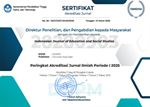Barrot, J. S. (2022). Social Media as a Language Learning Environment: a Systematic Review of the Literature (2008-2019). Computer Assisted Language Learning, 35(9), 2534-2562. https://doi.org/10.1080/09588221.2021.1883673
Beatty, A., Berkhout, E., Bima, L., Pradhan, M., & Suryadarma, D. (2021). Schooling Progress, Learning Reversal: Indonesia's Learning Profiles Between 2000 and 2014. International Journal of Educational Development, 85, 102436. https://doi.org/10.1016/j.ijedudev.2021.102436
Botha, M., & Gillespie-Lynch, K. (2022). Come as You Are: Examining Autistic Identity Development and The Neurodiversity Movement Through an Intersectional Lens. Human Development, 66(2), 93-112. https://doi.org/10.1159/000524123
Chuanchen, C. (2023). Cultivating Cultural Synergy: Unifying Boarding Schools, Local Wisdom, and Authentic Islamic Values for the Enhancement of Islamic Identity. Managere: Indonesian Journal of Educational Management, 5(2), 187-197. https://doi.org/10.52627/managere.v5i2.339
Daza, V., & Lund, A. (2021). Partnerships as Third Spaces for Professional Practice in Initial Teacher Education: a Scoping Review. Teaching and Teacher Education, 102, 103338. https://doi.org/10.1016/j.tate.2021.103338
De Villiers, C., Farooq, M. B., & Molinari, M. (2022). Qualitative Research Interviews Using Online Video Technology—Challenges and Opportunities. Meditari Accountancy Research, 30(6), 1764-1782. https://doi.org/10.1108/MEDAR-03-2021-1252
Dhakal, K. (2022). NVivo. Journal of the Medical Library Association: JMLA, 110(2), 270. https://doi.org/10.5195/jmla.2022.1271
Gao, C., Lan, X., Li, N., Yuan, Y., Ding, J., Zhou, Z., ... & Li, Y. (2024). Large Language Models Empowered Agent-Based Modeling and Simulation: a Survey and Perspectives. Humanities and Social Sciences Communications, 11(1), 1-24. https://doi.org/10.1057/s41599-024-03611-3
Jiang, D., Dahl, B., & Du, X. (2023). a Systematic Review of Engineering Students in Intercultural Teamwork: Characteristics, Challenges, and Coping Strategies. Education Sciences, 13(6), 540. https://doi.org/10.3390/educsci13060540
Kain, C., Koschmieder, C., Matischek-Jauk, M., & Bergner, S. (2024). Mapping the Landscape: a Scoping Review of 21st Century Skills Literature in Secondary Education. Teaching and Teacher Education, 151, 104739. https://doi.org/10.1016/j.tate.2024.104739
Karimova, B., & Bazylova, B. (2024). Cultivating Students' Cross-Cultural and Linguacultural Competences: Navigating Challenges and Opportunities. Journal of Social Studies Education Research, 15(3), 400-423.
Karimova, B., Ailauova, Z., Nurlanbekova, Y., & Bazylova, B. (2024). Cultivating Students’ Cross-Cultural and Linguacultural Competences’: Navigating Challenges and Opportunities. Journal of Social Studies Education Research, 15(3), 400-423.
Koehrsen, J. (2021). Muslims and Climate Change: How Islam, Muslim Organizations, and Religious Leaders Influence Climate Change Perceptions and Mitigation Activities. Wiley Interdisciplinary Reviews: Climate Change, 12(3), e702. https://doi.org/10.1002/wcc.702
Lambey, L., Usoh, E. J., Lambey, R., & Burgess, J. (2023). Challenges and Opportunities to Internationalize the Indonesian Higher Education Sector. International Business—New Insights on Changing Scenarios. https://doi.org/10.5772/intechopen.110658
Loonam, J., & O'Regan, N. (2022). Global Value Chains and Digital Platforms: Implications for Strategy. Strategic Change, 31(1), 161-177. https://doi.org/10.1002/jsc.2485
Lou, Y. (2023). The Cross-Cultural Experiences of International Secondary Students in Anglophone Countries—a Hermeneutic Literature Review and Conceptual Framework. Journal of Interdisciplinary Studies in Education, 12(1), 23-43.
Manca, S., & Delfino, M. (2021). Adapting Educational Practices in Emergency Remote Education: Continuity and Change from a Student Perspective. British Journal of Educational Technology, 52(4), 1394-1413. https://doi.org/10.1111/bjet.13098
Marge, M., Espy-Wilson, C., & Yu, Z. (2022). Spoken Language Interaction With Robots: Recommendations for Future Research. Computer Speech & Language, 71, 101255. https://doi.org/10.1016/j.csl.2021.101255
Naicker, S. (2021). Nephrology Education and Training in Africa. Nature Reviews Nephrology, 17(12), 784-784. https://doi.org/10.1038/s41581-021-00486-4
Pambudi, N. A. (2020). Vocational Education in Indonesia: History, Development, Opportunities, and Challenges. Children and Youth Services Review, 115, 105092. https://doi.org/10.1016/j.childyouth.2020.105092
Prosek, E. A., & Gibson, D. M. (2021). Promoting Rigorous Research by Examining Lived Experiences: a Review of Four Qualitative Traditions. Journal of Counseling & Development, 99(2), 167-177. https://doi.org/10.1002/jcad.12364
Rowe, W. E., & Krause, W. (2022). University-Based Leadership Education for Professionals Working in the Globalized Context. The Study and Practice of Global Leadership, 89-111. https://doi.org/10.1108/S2058-88012022006
Shadiev, R., & Yu, J. (2024). Review of Research on Computer-Assisted Language Learning With a Focus on Intercultural Education. Computer Assisted Language Learning, 37(4), 841-871. https://doi.org/10.1080/09588221.2022.2056616
Soyoof, A., Reynolds, B. L., Vazquez-Calvo, B., & McLay, K. (2023). Informal Digital Learning of English (IDLE): a Scoping Review of What Has Been Done and a Look Towards What Is to Come. Computer Assisted Language Learning, 36(4), 608-640. https://doi.org/10.1080/09588221.2021.1936562
Stickley, T., O'caithain, A., & Homer, C. (2022). The Value of Qualitative Methods to Public Health Research, Policy and Practice. Perspectives in Public Health, 142(4), 237-240. https://doi.org/10.1177/17579139221083814
Thunberg, S., & Arnell, L. (2022). Pioneering the Use of Technologies in Qualitative Research—a Research Review of the Use of Digital Interviews. International Journal of Social Research Methodology, 25(6), 757-768. https://doi.org/10.1080/13645579.2021.1935565
Valtakoski, A. (2020). The Evolution and Impact of Qualitative Research in Journal of Services Marketing. Journal of Services Marketing, 34(1), 8-23. https://doi.org/10.1108/JSM-12-2018-0359
Van Der Weele, S., & Bredewold, F. (2021). Shadowing as a Qualitative Research Method for Intellectual Disability Research: Opportunities and Challenges. Journal of Intellectual & Developmental Disability, 46(4), 340-350. https://doi.org/10.3109/13668250.2021.1873752
Yudintseva, A. (2023). Virtual Reality Affordances for Oral Communication in English as a Second Language Classroom: a Literature Review. Computers & Education: X Reality, 2, 100018. https://doi.org/10.1016/j.cexr.2023.100018
Zhang, H., Zhou, Y., & Stodolska, M. (2022). Socio-Cultural Adaptation Through Leisure Among Chinese International Students: An Experiential Learning Approach. Leisure Sciences, 44(2), 141-160. https://doi.org/10.1080/01490400.2018.1491351
Zhou, X., Chen, W., & Luo, L. (2023). The Impact of Artificial Intelligence on Higher Education: Opportunities and Challenges for the Future. Educational Technology & Society, 26(2), 123-134. https://doi.org/10.1186/s41239-023-00367-5
 (University of Glasgow, Glasgow, Scotland)
(University of Glasgow, Glasgow, Scotland) 



